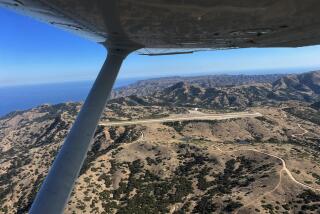Pilots Tackle Alcoholism at O.C. Facility : Treatment: Addiction Institute helps grounded airline personnel turn their lives around.
- Share via
COSTA MESA — Mike B. has always observed an ironclad rule: Don’t drink for at least eight hours before work.
Because he is an alcoholic, however, he used to consume booze like crazy right up to the deadline, often showing up for his job all jittery and hung over. “I was definitely not at my optimum,” admits the 53-year-old Mission Viejo resident.
This wouldn’t be so alarming except that Mike is a pilot for a major commercial airline. At one point, his drinking got so bad that a group of fellow pilots, including his boss, sat him down for a heart-to-heart talk.
The result was two suspensions--one a year long, the other nine months--during which Mike underwent treatment for alcoholism. Today, he says, he no longer drinks and is back at work regularly piloting thousands of passengers. He credits his turnaround largely to an Orange County-based program that probably treats more alcoholic pilots than any other in the country.
“Pilots (constitute) one of the most critical alcoholic subcultures,” said Dr. Joseph A. Pursch, a psychiatrist and medical director of the Addiction Institute located, appropriately, directly across the street from the John Wayne Airport. “Of all people, they are among the ones who hold our lives in their hands.”
Pursch, 63, is a pilot who began his career as a Navy flight surgeon stationed aboard an aircraft carrier in the early 1960s. It was there, he says, that he first became aware of alcohol as “America’s No. 1 defense against the inner and outer worlds.” In foreign ports from Barcelona to Beirut, Pursch said, he observed young Navy enlisted men and pilots drinking to “keep their heads emotionally above water.” Later as a staff physician at a military hospital in Bethesda, Md., he saw some of the same men suffering from the devastating physical and emotional effects of their drinking.
During the 1970s, Pursch made a name for himself by treating various celebrities for alcoholism, most notably former First Lady Betty Ford, presidential brother Billy Carter and astronaut Buzz Aldrin. At the same time, he was acting as a consultant in helping the FAA create an aggressive program to combat alcoholism among pilots, a program of which he is now a major component.
Since 1973, Pursch estimates, he has treated about 500 alcoholic pilots--nearly a third of the 1,700 who have gone through the FAA program nationally.
The program is exhaustive. Any pilot found drinking less than eight hours before flying can be summarily dismissed, according to FAA regulations. But while most pilots observe that rule, potential problems still exist among alcoholic pilots whose long-term effectiveness and judgment may be impaired.
Often such pilots are reported to FAA regulators by other pilots, members of their crews, concerned friends or spouses. When that happens, Pursch says, the pilots are immediately grounded and can only be recertified after completing a program like his, a process requiring at least four months.
They begin by spending up to two weeks in a local hospital drying out. Following that, Pursch said, the pilots live in a nearby residential facility while attending individual and group therapy sessions at the Addiction Institute.
Upon completion of the program, the doctor said, the recovering pilots are monitored by the FAA for two years to assure their sobriety and continued compliance.
While some experts maintain that the level of alcoholism among pilots is on a par with the national average of 10%, Pursch puts it higher--at about 15%. That’s because pilots tend to be male, action-oriented, hard-driving, macho types whose lifestyles are conducive to hard drinking, the psychiatrist said. “They tend to be the John Wayne type as opposed to the Woody Allen type,” he said.
Pursch has also found them to be highly responsive to treatment. Among his own pilot patients, he said, about 92% are still not drinking two years after treatment, compared to a national average among all alcoholics of 65% to 70%. The high success rate, Pursch believes, is a result of strong motivation inspired by pressure from the FAA.
“They stand to lose a $150,000 annual income,” the psychiatrist said, “and hardly any know of anything else they can do. They have a hammer hanging over their heads.”
Treatment for the pilots is basically the same as for any other alcoholics, Pursch said. Essentially it consists of teaching them, through therapy, to do without alcohol what they were trying to do with it; namely get along with wives, children and co-workers, as well as handle the stresses of daily life.
In addition to sessions at the Addiction Institute, Pursch said, the pilots are encouraged to join Birds of a Feather, an Alcoholics Anonymous group especially for them.
Many say their experiences at the institute rescued them from the brink of disaster.
“I had a heck of a time balancing drinking and work,” said Bill P., 55, who retired from Pacific Southwest Airlines in 1987 after a career spanning 22 years. “I had to be taken to a hospital and dried out before working. I just couldn’t take it any more.”
Bill A., 48, of Costa Mesa, who hopes to return to flying soon after being grounded for nearly a year, said the program probably saved his career. “My life was a mess,” he said. “I was sick and tired.”
And Robin B., 28, of Tustin expressed gratitude to the airline company from which he is on leave for forcing him to seek treatment for his addictive behavior.
“This program is the best thing that ever happened to me,” Robin said. “I almost died and this saved my life.”
More to Read
Sign up for Essential California
The most important California stories and recommendations in your inbox every morning.
You may occasionally receive promotional content from the Los Angeles Times.













